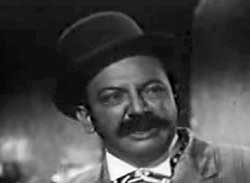 Spike Jones & His City Slickers: A Musical Review (1947) was a one-reel film made up of three individual soundies. First is Clink! Clink! Another Drink! (1942) which was a hit single, re-released in 1949 as the "Clink Clink Polka" when it was a hit a second time.
Spike Jones & His City Slickers: A Musical Review (1947) was a one-reel film made up of three individual soundies. First is Clink! Clink! Another Drink! (1942) which was a hit single, re-released in 1949 as the "Clink Clink Polka" when it was a hit a second time.
The group was pretty much entirely devoted to novelty tunes & have to be assessed both musically & for the effectiveness of their comedy.
Clink! Clink! Another Drink! has Spike's boys in handlebar mustaches & bowler hats looking like they just stepped into a Prohibition era speak easy raising foamy glasses of beer to sing:
"Clink, clink, another drink/ And plenty in the cellar when it's gone/ Drink, drink, the glasses clink/ Making tinkly music till the breaking of the dawn."
The lead singer, as is usually the casem is Del Porter. Spike as the bartender uses sundry bar stuff for drumming.
As an amusing drinking song it's good to average & musically it's effective if not one of Spike's best pieces, though a few raggedy ragtime licks when they're not singing are sure well done.
Add the visual experience & funny sound FX, however, & it's terribly entertaining. Included is a scene that makes it a "sing along" with lyrics showing on the screen of a panoram jukebox, on which this soundie would initially have been viewed.
The highlight as a comedy is when Mel Blanc puts in appearance as a drunken hiccoughing singer, pretty much doing it with his Sylvester the Cat voice. He's great.
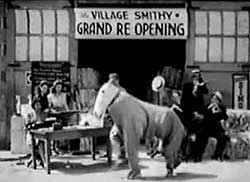 On a set designed to look like a smithy shop, under a sign that reads "Village Smithy Grand Re Opening," Spike Jones with a couple of his bandmates are performing in Blacksmith Song (1942). Spike is shirtless playing the anvils.
On a set designed to look like a smithy shop, under a sign that reads "Village Smithy Grand Re Opening," Spike Jones with a couple of his bandmates are performing in Blacksmith Song (1942). Spike is shirtless playing the anvils.
It's a comedy tune like everything this band recorded under the "City Slickers" banner, but with a wartime message of rationing. The lyrics presume the happy new prosperity of the blacksmith who with rationing of rubber finds more horses need to be shod.
This version is arranged differently with variant lyrics from the record release. The song itself is barely funny & musically just not good, but the visual theatricality of Spike zipping around in the blacksmith set is amusing. The fake horse dancing & singing is just too jolly; & the trumpet doing the horse-laugh adds to the humor.
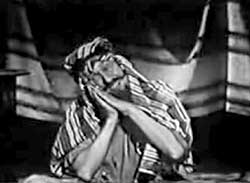 The third of three soundies on the 1947 one-reeler is Shiek of Araby (1942), beginning with a bellydancer & slight clue of the comedy to follow. The third of three soundies on the 1947 one-reeler is Shiek of Araby (1942), beginning with a bellydancer & slight clue of the comedy to follow.
The City Slickers are dressed in Arabic costumes as they play their instruments. Suddenly the dancer rips part of her costume & runs away leaving the Shiek sucking a lollipop & his right-hand-man Del Porter to sing the title song.
Half the song is sung semi-straight, apart from strong mugging. At the instrumental break we hear the fart-a-phone & odd-object drumming.
The bellydancer returns & the sheik (Carl Grayson) sings the rest of the song himself, in a funnier voice than Del. It's an amusing performance even without the usual over-the-top antics.
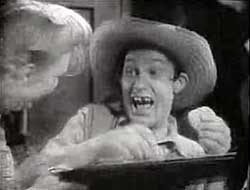 Initially Spike Jones & His City Slickers weren't city slickers at all but the name was ironic. They were hicks & play that attribute as outright hillbillies in Pass the Biscuits Mirandy (1942).
Initially Spike Jones & His City Slickers weren't city slickers at all but the name was ironic. They were hicks & play that attribute as outright hillbillies in Pass the Biscuits Mirandy (1942).
This was the only Panoram Soundie they recorded as the City Slickers that wasn't collected on the one-reel set. They did additionally sing "straight" on a few other soundies for background harmony.
They're all badly dressed as hill jacks living together in a cabin, singing of their love of mountain dew & Mirandy's biscuits:
"Oh pass the biscuits Mirandy/ I'm just as hungry as sin/ Pass the biscuits Mirandy/ Give me some sop to sop 'em in." The whole group sings part of the time & Del Porter sings lead bits while the rest whistle.
Mirandy, played by Helen Grayco, a singer in her own right, & another hillbilly gal, are at the iron stove cooking up a storm & serving biscuits. The joke is that the biscuits are hard & awful. "Pass the biscuits" becomes an anthem parallel to "pass the amunition," useful during clan feuds.
As the boys are gathered around a rustic table we don't get to see them playing the instruments. But before the number is over, Spike is drumming on the table with utensils, Del whips out his ocorina, another of the lads pretends a funnel is his horn, a tin bowl the mute; another is blowing on a moonshine jug.
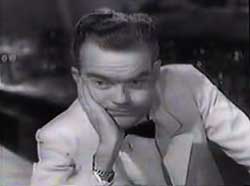 Spike Jones & his City Slickers star in the short film Cocktails for Two (1945) a year after recording their comedy version. Sam Caslow who wrote the number reportedly disliked Spike's take, because he had written a romantic song & Spike made it such a hit that people forgot it was ever not funny.
Spike Jones & his City Slickers star in the short film Cocktails for Two (1945) a year after recording their comedy version. Sam Caslow who wrote the number reportedly disliked Spike's take, because he had written a romantic song & Spike made it such a hit that people forgot it was ever not funny.
But Caslow was the soundie producer who gave Spike & his city slickers their first film appearances in those 1942 soundies, & I have trouble believing he totally resented how the band could make songs funny.
Still, when Spike was able to do a hyserical version of "You Always Hurt the One You Love" or "Ghost Riders in the Sky" he did so without eradicating public appreciation of serious versions. For Caslow it was in restrospect an unexpected misfortune that "Cocktails for Two" was never again to be heard by anyone without being reminded of Spike's hit version.
The difference was, of course, Caslow's song really did have comedy lyrics though he didn't realize it. The lead-in lyrics includes such lines as "Respectably drinking like civilized ladies & men" & if sung with a straight face that's still ridiculous, the cocktail & martini generation having been some of the worst public drunks despite their mistaken self-image.
The filmed version opens with serious choral arrangement & a cocktail lounge setting, "civilized ladies & men" drinking & smoking. Then Carl Grayson begins a straightfaced performance while a drunkard yahoos & Spike as bartender toots horns.
Where the lyric speaks of smoking the drunkard coughs & chokes. Where beautiful music is alluded to a terrible violinist steps into the picture for a second. And so with an endless string of gag commentaries of whistles, clinks, popping corks, bells, breaking classes, as Grayson obliviously sings.
The drunkard's hiccoughed instrumental break is the real highlight. It ends with a "girl" chorus which is three of the bandmembers in drag.
copyright © by Paghat the Ratgirl
|
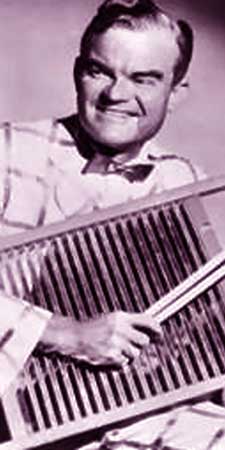


 The third of three soundies on the 1947 one-reeler is Shiek of Araby (1942), beginning with a bellydancer & slight clue of the comedy to follow.
The third of three soundies on the 1947 one-reeler is Shiek of Araby (1942), beginning with a bellydancer & slight clue of the comedy to follow.
